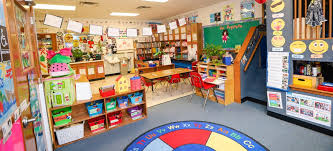
The Importance of Learning Centers
Learning centers play a crucial role in providing educational support and resources to individuals of all ages. These centers are designed to offer a variety of learning opportunities in a structured and supportive environment.
One of the key benefits of learning centers is their ability to cater to diverse learning styles. Whether someone is a visual, auditory, or kinesthetic learner, learning centers can provide tailored resources and activities to accommodate different learning preferences.
Furthermore, learning centers often offer personalized instruction and guidance. This individualized approach can help learners progress at their own pace and receive targeted support in areas where they may be struggling.
Learning centers also foster a sense of community and collaboration among learners. By bringing together individuals with similar educational goals, these centers create a supportive network where students can learn from each other and build meaningful connections.
Overall, learning centers serve as valuable educational hubs that empower individuals to enhance their knowledge, skills, and confidence. Whether someone is seeking academic support, professional development opportunities, or simply looking to explore new interests, learning centers offer a welcoming environment for growth and enrichment.
Understanding Learning Centers: Key FAQs Answered
- What is classroom learning center?
- What is the purpose of a learning center?
- What are the three learning centers?
- Which is better Sylvan vs Huntington learning Center?
What is classroom learning center?
A classroom learning center is a designated area within a classroom that is specifically designed to provide students with hands-on, interactive learning experiences. These centers are typically equipped with various educational materials, resources, and activities that cater to different subjects or skills. Classroom learning centers aim to enhance the traditional classroom setting by offering students opportunities for independent exploration, collaborative learning, and individualized instruction. By incorporating these centers into the classroom environment, educators can create dynamic and engaging learning experiences that cater to diverse learning styles and promote active student participation and discovery.
What is the purpose of a learning center?
The purpose of a learning center is to provide a structured and supportive environment where individuals can access a variety of educational resources and opportunities. Learning centers aim to cater to diverse learning styles by offering tailored activities and materials that accommodate different preferences. Additionally, these centers strive to provide personalized instruction and guidance to help learners progress at their own pace and address any areas of difficulty. By fostering a sense of community and collaboration, learning centers create a supportive network where individuals can engage with others, learn from each other, and build meaningful connections. Ultimately, the primary goal of a learning center is to empower individuals to enhance their knowledge, skills, and confidence through accessible and engaging educational experiences.
What are the three learning centers?
In the context of educational settings, the term “learning centers” typically refers to physical spaces within a classroom or learning environment that are designed to facilitate specific types of learning activities. While the specific types of learning centers may vary depending on the educational philosophy and goals of a particular program, three common examples include literacy centers, math centers, and science centers. Literacy centers are dedicated spaces where students can engage in reading, writing, and language activities to enhance their literacy skills. Math centers provide opportunities for students to practice mathematical concepts through hands-on activities and games. Science centers offer interactive experiences that allow students to explore scientific principles through experiments and observation. Each of these learning centers serves as a valuable resource for promoting active learning and skill development among students.
Which is better Sylvan vs Huntington learning Center?
When comparing Sylvan Learning Center to Huntington Learning Center, it is important to consider the specific needs and preferences of the individual seeking educational support. Sylvan Learning Center is known for its personalized tutoring programs that cater to a wide range of subjects and grade levels, while Huntington Learning Center offers comprehensive test preparation services alongside academic tutoring. Both centers have a reputation for experienced instructors and proven teaching methods. Ultimately, the choice between Sylvan and Huntington may depend on factors such as location, cost, teaching approach, and the specific educational goals of the student or learner. It is recommended to explore both options in-depth and consider scheduling consultations or trial sessions to determine which learning center aligns best with one’s needs and learning style.
